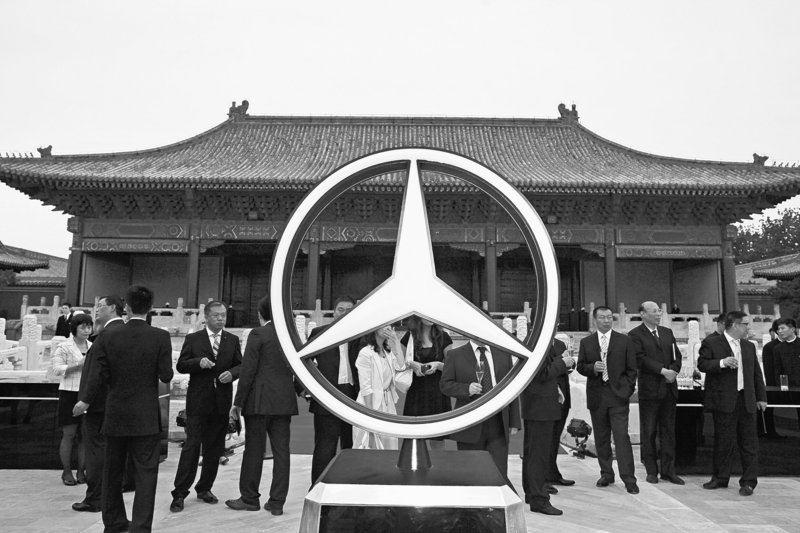BERLIN – Germany’s car industry, the backbone of Europe’s largest economy, is booming again.
Fueled by the huge appetite for German luxury cars in China and the fact that the plunging euro has made European products cheaper abroad, manufacturers say they are shaking off the last of the economic downturn, adding extra shifts and hiring more workers to meet increasing demand.
Mercedes, Volkswagen, BMW and Audi all told The Associated Press this week that order books are full, some plants are operating at full capacity, and officials are bullish on their outlook for the full year.
It’s a remarkable turnaround for an industry that last year had to take advantage of a government plan to reduce their workers’ hours to avoid large-scale layoffs.
BMW AG says demand started increasing at the beginning of the year and the company has increased its number of temporary workers from 1,500 to 5,000 since January. “We’re currently negotiating with employees to add extra shifts because order books are full,” said Marc Hassinger, a spokesman for the Munich company.
BMW’s traditional rival, Daimler AG’s Mercedes Benz unit, is already operating several plants at capacity production. Mandatory summer holidays introduced during last year’s downturn, have been scrapped or shortened. The number of temporary workers has doubled from 900 to 1,800, the company says.
Mercedes, based in Stuttgart, now expects to post an overall double-digit growth figure for the second quarter, partly fueled by rising demand from China.
“China is already our third most important market and number one for the S-class,” spokeswoman Verena Mueller said, referring to Mercedes’ flagship cars. Sales from January to May in China grew by 107 percent, she said. Mercedes plans to sell more than 100,000 cars there in 2010, up from 70,000 a year earlier.
BMW is also counting on China, where it sold 34,179 cars in the first quarter, an increase of 106 percent over last year, and where sales are forecast to increase from 90,000 last year to 120,000 in 2010.
Much of the industry worldwide has seen gains this year amid the global auto sales recovery. General Motors Co. roared back from bankruptcy to a quarterly profit, while Toyota also returned to profit in the latest quarter.
But the growth in the Chinese premium car market is expected in particular to help the growth and profitability of German carmakers, accounting for 15-20 percent of pretax earnings at BMW and 10-15 percent at Mercedes, CreditSuisse analyst Arndt Ellinghorst said in a research note last week.
Even as competition in China is getting fiercer, the London-based analyst sees German carmakers as well-positioned there. “Premium brands still command luxury status, insulating them from potential competition that is becoming ever more apparent in the mass market,” he said.
For Volkswagen AG, Europe’s biggest carmaker, China is already the single most important market and an important growth driver. First-quarter sales there, already at a high level, rose 48 percent to 777,800 units, the company said. That helped offset sales in Germany, where demand for the group’s Volkswagen, Seat, Skoda and Audi cars dipped by 12 percent to 436,900 units.
The bulk of growth for Volkswagen’s luxury brand Audi also lies in China, which is expected to become the brand’s most important market, even over the company’s home turf.
“There will be a neck-and-neck race between Germany and China this year,” said Audi spokesman Juergen De Graeve.
Currency effects have also been a huge boon for the German auto industry, as the declining euro makes European cars cheaper in the U.S. and in countries with their currency linked to the dollar such as China. The euro, which traded above $1.50 in December, hit a four-year low below $1.19 on June 7.
Send questions/comments to the editors.



Success. Please wait for the page to reload. If the page does not reload within 5 seconds, please refresh the page.
Enter your email and password to access comments.
Hi, to comment on stories you must . This profile is in addition to your subscription and website login.
Already have a commenting profile? .
Invalid username/password.
Please check your email to confirm and complete your registration.
Only subscribers are eligible to post comments. Please subscribe or login first for digital access. Here’s why.
Use the form below to reset your password. When you've submitted your account email, we will send an email with a reset code.